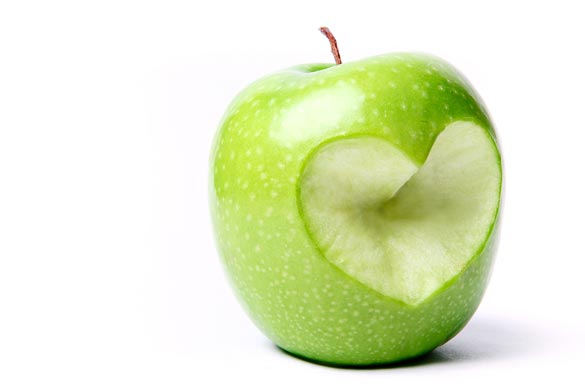The Emotionally Charged Conversation of Health, Diet and Nutrition: 5 Ways to Support Your Fellow FBGs
This guest post is from Chanda Guerin. A health and nutrition education masters of science candidate who enjoys yoga, hiking and farmers’ markets, Chanda is also a food blogger and child nutrition enthusiast. Her recipes, rants about current diet trends, and lusty thoughts of Cheetos and Pepsi can be found at LoveandAPinchofSalt.com.
For Fit Bottomed Girls (and Mamas!) who have a passion for fitness and nutrition, a scroll through social media can be frustrating and disheartening. I “like” more than 45 Facebook pages and follow everyone possible on Twitter related to nutrition to stay connected and in-the-know about current diet trends and food news. I always find inspiring and encouraging words from FBG’s status updates and tweets, and articles from women with positive messages about self-image and food choices. I’ve expanded the diet and lifestyle pages I follow on Facebook and feel let down by some of the messages I’m reading. From harsh criticisms of others’ food choices to commentary on strangers’ parenting abilities, I feel my excitement for the nutrition and community health waning. It’s a simple click to “unfollow” pages and avoid the negativity, I know, but I find myself wishing for a more positive, supportive discussion of nutrition and health in social media and online in general.
I was introduced to FBG in 2010 by Tish Merritt and was instantly hooked on the girl power ambition of the site and community. When I started my master’s program in nutrition education, the ideal of FBG has gone into every research paper and blog post I write. How can I empower women and my community to make the best food choices possible? I wasn’t anticipating the emotionally charged conversation waiting for me: internet memes chastising vegetarians, role models of primal-eating groups mocking people who can’t afford to spend $15 per pound on the highest quality meat, and comment chains between users condemning any food choices unlike their own. And it’s not just online; the same emotionally charged conversations occur between friends, coworkers and family. Where does this judgment and emotion come from and why are we so quick to jump on the train?
I found myself doing the very same thing when a recently switched vegan friend explained she couldn’t have a beer on tap at the brewery because it had honey in it. As a vegan, she wouldn’t have honey because it’s an animal product. Despite my upset about the negativity I’ve been seeing online, I caught myself holding back an eye roll. Why did I care whether or not she was going to eat honey? That’s when it clicked for me. Her decision to not eat honey and be vegan went against my beliefs about nutrition and health, and honey as an animal-harming product didn’t make sense to me.
It’s the same reason we’re told not to discuss religion and politics at parties or with your conservative uncle. Our diet, food choices and how we care for our bodies are as much a part of who we are as our religious/spiritual beliefs and who we voted for in the last election. The foods we choose to put into our bodies support our health and well-being, how we nourish ourselves and care for our families. We have to believe what we are putting on the kitchen table and into our bodies is the best choice for us. So really, that’s what it’s about — doing what’s best for you and supporting those around you in a positive and meaningful way.
Here are five ways to be part of the positive nutrition and health movement!
5 Ways to Support Your Fellow FBGs
1. Start following Fit Bottomed Girls, Mamas and Eats on Facebook, Twitter and Instagram! I’m partial, but this is your best source of girl power fuel for workouts, recipes and support. All three sites encourage women to rock that junk in the trunk and take care of their bodies.
2. Avoid joining the social media arguments on diets and nutrition. I’ve added my two cents to a few too many posts and then got a notification every time someone added a new “fact” or mean poke at those of us who get our protein from beans and eggs. I was more and more upset with every notification when I could have just ignored the conversation from the start. Which leads me to number three …
3. Do what works for you and unfollow any negative or disparaging conversations online. If your food choices are healthful and you feel mentally and physically well, that’s what’s important. And if the messaging online is making your face turn redder than a cartoon character with steam coming from its ears, unfollow the page or block it from your feed.
4. Ask questions and seek out information if you’re curious about diet and nutrition. There are many resources and books available online about how our body uses food as fuel, heals minds and bodies holistically, and creates communities between neighbors, friends, colleagues and families. If you’re curious about why vegans don’t eat honey, ask a friend or do a quick Google search.
5. Support your friends and family in their personal paths to health and happiness. You don’t have to give up honey or any other animal products, or even agree with it, but you should be a good friend. Share the latest bacon recipes with your Paleo friends when you find something tasty online and bring your best vegetarian dish to the next potluck (or vice versa depending). I’m not a bacon fan, but when I saw bacon wrapped sweet potatoes on Facebook, I immediately hit “share” and passed them over to my Paleo bacon-loving best friend.
Have you noticed how emotionally charged diet and nutrition conversations can get? What’s been your experience? —Chanda Guerin

